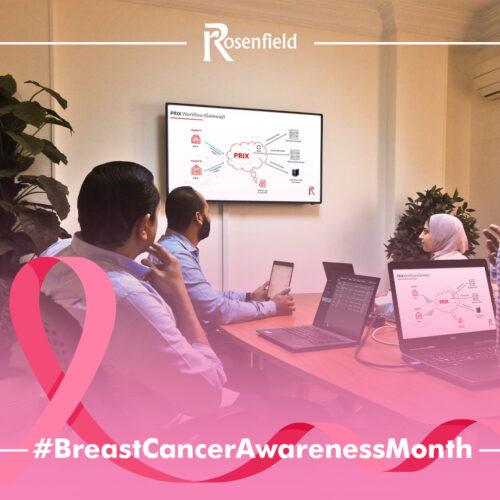
Faster Anonymisation, Smarter Research: The Role of AI in Breast Cancer Innovation
October is Breast Cancer Awareness Month, a time to raise awareness, support those affected, and celebrate advancements in research and treatment. While significant strides have been made, early detection and effective treatment remain crucial for improving outcomes. In this article, we’ll explore how innovative tools and technology are revolutionising breast cancer care, from diagnosis to treatment.
Breast cancer remains one of the most prominent health concerns worldwide. With over 2 million new cases diagnosed globally every year, researchers, clinicians, and technologists are constantly seeking innovative ways to improve detection, diagnosis, and treatment. While early detection remains key to successful outcomes, cutting-edge technologies—such as the combined power of artificial intelligence (AI) and data anonymisation—are revolutionising how breast cancer is understood and treated.
Anonymisation of medical data is a critical step for ensuring privacy and empowering smarter, data driven research. And now with innovative and intelligent technologies to scale how patient data is anonymised, diagnosis times are being accelerated and patient care enhanced.
Early detection of breast cancer is critical because it drastically increases the likelihood of successful treatment. According to the World Health Organization (WHO), when breast cancer is detected early, patients have a higher chance of survival and may require less aggressive treatment. However, traditional methods such as mammograms and physical exams have limitations. Despite their importance, they are not always effective at catching cancer at its earliest, most treatable stages.
This is where artificial intelligence started to make waves. AI-powered imaging systems can now assist radiologists by analysing mammograms more quickly and accurately, identifying subtle abnormalities that may be missed during manual review. In fact, a 2020 study published in Nature reported that AI systems outperformed human radiologists in diagnosing breast cancer from mammograms, reducing both false positives and negatives. This shift is a critical step toward improving diagnostic precision and outcomes.
AI’s Role in Advancing Breast Cancer Detection
AI technologies are transforming the way breast cancer is diagnosed and treated by offering:
1. Enhanced Imaging Capabilities
AI has the ability to process and analyse imaging data much faster than human radiologists. By using machine learning algorithms, AI systems can detect patterns and anomalies in mammograms, ultrasound scans, and MRIs that may not be immediately apparent to the human eye. These systems learn from vast datasets of labelled medical images, identifying even the smallest indicators of cancerous cells.
For example, Google’s AI system, developed in collaboration with UK’s NHS, demonstrated a reduction in diagnostic errors when screening mammograms. The potential for these AI-driven tools to improve detection rates in hospitals across the world is immense.
2. Predictive Analytics for Risk Assessment
AI doesn’t stop at image recognition. It is also being used to predict the likelihood of breast cancer development based on patient history, genetics, and lifestyle data. Predictive analytics powered by AI can offer physicians insights into which patients may be at higher risk of developing breast cancer, enabling earlier interventions and personalised treatment plans.
3. AI in Pathology
While AI in imaging is widely discussed, its role in pathology is equally transformative. Pathologists rely on detailed microscopic analysis to diagnose cancer accurately. AI tools can assist by scanning tissue samples to detect cancerous changes in cells, automating an otherwise time-intensive and highly specialised task.
According to research published by The Lancet, AI models trained on pathology images could match or exceed human accuracy in diagnosing cancers like breast cancer, further enhancing early detection.
The Crucial Role of Data in AI-Driven Research
AI’s potential hinges on data—and lots of it. To train machine learning algorithms, researchers need access to vast datasets that include imaging studies, patient histories, treatment outcomes, and genetic profiles. By analysing large, diverse datasets, AI systems can detect patterns, make predictions, and continuously improve diagnostic accuracy.
However, the data required is obviously sensitive patient information and protecting patient identity remains paramount. With stringent regulations like GDPR in the UK and Europe combined with an ethical responsibility towards patient privacy, personal identifiers from medical data need to be removed, ensuring patient confidentiality while enabling its use for research purposes. This is where efficient anonymisation plays a critical role.
Faster Anonymisation: Unlocking the Power of Data for Breast Cancer Research
Without anonymisation, it would be impossible for hospitals, research institutions, and healthtech companies to collaborate on large-scale AI projects. Yet, the anonymisation process can be time-consuming, particularly when done manually, which is where innovative solutions like PRIX step in.
PRIX: Anonymising at Scale
PRIX is a cutting-edge, vendor-neutral anonymisation tool that automates the anonymisation of bulk imaging studies. It addresses one of the most significant bottlenecks in research—manually anonymising datasets. By enabling healthcare professionals to anonymise hundreds of imaging studies in a matter of minutes, PRIX accelerates the availability of data for AI training and research while ensuring compliance with privacy regulations like GDPR. It anonymises 100 X-RAY studies in only 4 minutes.
In the context of breast cancer research, PRIX’s rapid anonymisation capabilities ensure that de-identified imaging datasets can be shared more quickly and efficiently between hospitals, research labs, and AI developers. This is crucial for feeding the data-hungry AI models that are revolutionising detection, diagnosis, and treatment of breast related cancer.
As Ahmed Adnan Elsharkawy, a leading expert in Radiology Informatics and CEO of Rosenfield Health, explains “We believe that data is the key to unlocking new breakthroughs in breast cancer research. By accelerating the anonymisation process, we’re empowering researchers to access and analyse vast datasets without compromising patient privacy.”
PRIX plays a pivotal role in facilitating AI-driven breast cancer innovations. By speeding up the anonymisation process, PRIX allows AI researchers to focus on what they do best—training algorithms that improve healthcare outcomes.
AI in Breast Cancer Treatment
By combining the power of AI and bulk anonymisation, researchers, oncologists and radiologists can quickly access large, anonymised datasets. These vast data resources enable faster analysis and training of AI models, leading to quicker, more accurate diagnoses. This efficiency can significantly reduce diagnosis times, which is crucial for improving patient survival rates.
The Future of Breast Cancer Care
As AI and anonymisation technology continue to evolve, we can expect even more groundbreaking advancements. The integration of these technologies will reduce diagnosis times further, improve treatment accuracy, and ultimately contribute to higher survival rates. From advanced imaging techniques to AI-assisted therapies, the future of breast cancer care is rapidly evolving.
Conclusion
Breast Cancer Awareness Month is a reminder of the importance of early detection, research, and support for those affected by this disease. By harnessing the power of technology, we can make significant strides in improving outcomes and ultimately, defeating breast cancer.
Recent Posts
Archives
- December 2024
- November 2024
- October 2024
- September 2024
- August 2024
- April 2024
- February 2024
- January 2024
- April 2022
- November 2021
- August 2021
- May 2021
- April 2021
- March 2021
- February 2021
- December 2020
- November 2020
- October 2020
- July 2020
- April 2020
- December 2019
- October 2019
- August 2019
- July 2019
- June 2019
- April 2019

